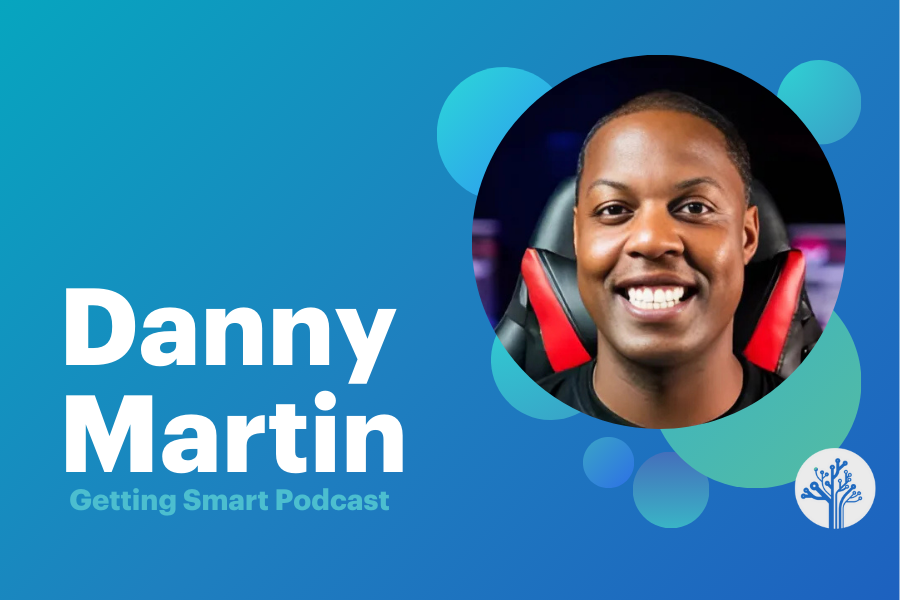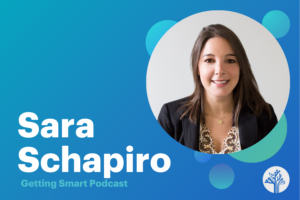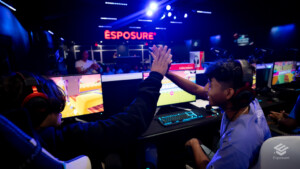Danny Martin on Esposure and the Promise of eSports Pathways
Key Points
-
eSports offers a powerful platform for building community and teaching vital workforce skills, particularly in technology and entrepreneurship.
-
Programs like eSposure’s integrate AI to create adaptive, hands-on learning experiences, preparing students for future careers.

Project Lead the Way is a proven national leader in science, technology, engineering, and math education, for Pre-K through high school. They strive to help teachers make every student in every grade STEM-successful, through interactive, problem-based learning. Learn more and find a school with Project Lead The Way near you.
In this episode of the Getting Smart Podcast, Victoria Andrews takes us into the transformative world of eSports alongside Danny Martin, co-founder and CEO of eSposure. With eSports growing into a $250 billion industry, it’s more than just competitive gaming; it’s a thriving ecosystem that fosters community, teaches valuable workforce skills, and opens pathways to entrepreneurship. Victoria shares how eSports has redefined the way students engage with education, offering opportunities for personal and professional growth. Danny talks about how programs like eSposure are bridging gaps, particularly for economically disadvantaged communities, by integrating technology and innovation into learning experiences.
Danny Martin explores the integration of AI in education through immersive learning experiences. By simulating real-world scenarios, such as managing an eSports team, students develop critical thinking, teamwork, and problem-solving skills essential for the future workforce. The podcast delves into how eSports not only prepares students for careers in gaming but also equips them with versatile skills applicable across various industries. Victoria and Danny discuss the importance of creating educational programs that are both engaging and impactful, ensuring students are not only consumers of technology but also creators and innovators. Tune in to learn how eSports is shaping the future of education and workforce development.
Outline
- (00:40) Discovering the World of eSports
- (03:29) The Community and Industry of eSports
- (09:03) Entrepreneurship and Education in eSports
- (17:55) Future of eSports and AI Integration
Discovering the World of eSports
Victoria Andrews: You’re listening to the Getting Smart podcast. I’m Victoria Andrews, and I have my nephews to thank for our guest today. A couple of years ago, I was attending a session at South by Southwest, and the presenter was captivating. He was talking about eSports—how it’s a fantastic way to create community and a sense of belonging for students, how it introduces them to workforce skills, and how it reengages students with education and learning. At that time, I wasn’t even sure what drew me to that session; I just thought, “This is great information to have.” I’m fortunate to be the aunt to three nephews, one of whom is extremely passionate about gaming, eSports, and entrepreneurship. He’s even in the process of starting his own business.
A couple of summers ago, he shared his passion for starting his own business in eSports. My mind circled back to that South by Southwest session, and I signed him up for a program out in Duncanville where he was exposed to content creation, graphic design, being a screencaster, what it means to be a content creator, and so many other opportunities within the eSports arena and ecosystem. My mind was blown because I had never seen a young Black man have so much passion, energy, knowledge, and lived experience, and he was willing to share it in such a big way.
I have my nephew, Dorian, to thank, and I also have Danny Martin to thank for exposing me to the mind-blowing world of eSports. I’m so grateful to have Danny Martin from eSposure here with me today. He’s the co-founder and CEO. Welcome, Danny!
Danny Martin: Welcome, welcome, welcome! Yes, this is exciting. Thank you for the opportunity to provide insight to your nephew—you’re the cool one.
Victoria Andrews: I try.
Danny Martin: That’s really awesome, and it’s great to be able to stay connected and provide opportunities not only to your nephew but to many other individuals within the organization.
At eSposure, we’re supremely thankful for the opportunity because that’s why we started—to shed more light on this industry for all walks of life, especially individuals from economically disadvantaged communities. This is a significant benefit for so many people to be able to hear this insight. So, thank you for that.
Victoria Andrews: No, thank you, Danny. We’re going to have a great time. We’re both from Texas, so we know how to have a good time. I’m looking forward to the conversation.
The Community and Industry of eSports
Victoria Andrews: What I noticed about the eSports community is that it creates such a strong community. It’s passionate. And if you think about it, one of my definitions of community is actually being in close proximity to people, but eSports transcends that because typically, you’re not in the same space when you’re playing against other people. I grew up playing Sonic and Mario, so I was sitting next to my brothers, but that’s no longer the case. You could literally be playing against someone across the world. Can you share a bit about the sense of community that surrounds eSports and that group?
Danny Martin: Yeah. First off, the context of it is important to know—the expansion of the industry. We’re looking at approximately a $250 billion industry from a gaming perspective. When you think about that, it surpasses both music and movies combined. And now you’re starting to see movies and music enter the gaming industry to help their respective sectors grow. It’s really cool to see.
When you think about the gaming industry, there’s a huge opportunity for game development companies like Epic and Activision. As they build these games, they identify that a great way to sell units is by creating functionality that allows games to be highly competitive. When you can see LeBron James on the court, you quickly recognize you can’t do what he can at his age. You pay for a ticket to watch him, right? Similarly, people love to watch others excel at games like Fortnite or NBA 2K. That helps game developers sell copies, as people want to see if they can play as well as these top players. In eSports and gaming, you don’t need to be 200 pounds of brawn or the fastest person in the world—you leverage your mind. This allows people to believe they could be the next professional gamer.
In these environments, you realize, “I can play with someone on the other side of the world.” Over time, you build relationships with those people. Think about it—you’re playing with someone in Korea, and while waiting in the lobby, you ask them about their family, what it’s like where they live. You’re building relationships, like a modern version of having a pen pal. Remember pen pals? It’s like writing to someone and waiting for a letter back, which builds a unique bond.
Tournament organizers saw the opportunity to host tournaments with prize purses in ballrooms, arenas, or even spaces like ours. You’re in a lobby with friends saying, “Did you hear about that tournament? It has a $1,000 prize purse, or maybe $20,000. Sometimes it’s even $20 million.” You end up planning to attend with friends, getting hotels, and making it like a family reunion. You’re in a building with others, and even if you get knocked out early, you still go to lunch, dinner, and enjoy the fellowship. That’s how strong this community is. I used to feel intimidated traveling to tournaments, especially since I wasn’t a great gamer. I was more on the entrepreneurial side, thinking about how I could add value to the community. I couldn’t speak the gaming lingo, like the meta or the shots, so I wondered if people would talk to me or if I had anything to offer.
Eventually, I thought, “You’re all gamers who want to grow your brand. How can I help with that?” So, I’d go into these communities, and even though I wasn’t a photographer or videographer, I’d take a camera and start taking shots. People would ask, “Where can I get that photo?” Soon, I was making friends. Everyone in this community shares a passion for gaming, competition, and finding belonging. That’s what makes this community so close-knit. We’ve had games from Pong to League of Legends, and each has its unique community. That’s why we advocate for different ways to be part of this. It’s not just about being the best gamer; there are many career paths within this industry.
Victoria Andrews: I love that you mentioned fellowship. For me, fellowship centers humanity; it centers the person. So, it’s not just about who’s the best, who has the most points, who scores the touchdowns, or what skin you have in Fortnite. It’s about that connection, the human connection, centering humanity. I love the analogy of the pen pal. I had a pen pal growing up, and it was special when you finally met them in person. Knowing that eSports can provide that connection for young people in a new way is important.
Entrepreneurship and Education in eSports
Victoria Andrews: You hinted a bit about coming from an entrepreneurial mindset, which might not commonly pair with eSports in many parents’ minds. They may not see the connection between entrepreneurship and eSports, but there is one, along with opportunities for career exploration. Can you share a little about the work you’ve done with SMU (Southern Methodist University) and Dallas ISD?
Danny Martin: Yes, absolutely. We’re living in the future of work. We should be thinking about what careers will look like in the next 5, 10, or 20 years. Many of these careers will be software-based, and software is becoming dynamic enough that you can learn a program and use it for a job in a day, a few weeks, or a few months. That’s especially true with AI. So, individuals who learn these software skills can enter the gig economy easily and often have a side business while going to school or working.
COVID showed us that we all have elements of entrepreneurship within us as people learned new skills and adapted. Many began exploring different software and upskilling themselves. At our facility, everything revolves around some type of software—from podcasting and video editing to running production. These are real careers within eSports, gaming, and beyond. So, when it comes to entrepreneurship, it’s in all of us. The future of work is guiding us toward it, and it’s easier to access now than it was 10 or 20 years ago.
If you think about students and encourage them to pick up a software or technical skill, they may be learning project management by setting up PCs or running events. These are skills that benefit them. That’s how I entered eSports and gaming in 2010. I saw people wanting to compete but lacking opportunities to showcase their skills, so we started creating events. To run an event, you need someone to operate brackets, create digital flyers, and handle various tasks. Those were the skills that led us to create a company around teaching people those skill sets.
The more tournaments we have, the more opportunities we create for people to showcase their skills and do what they love. Sometimes, people come to the game to escape or to find community. A lot of students and young people approach it that way, sharing their passion with others.
I’ve even had parents come to me, saying, “I learned so much about my child by playing a game with them. It’s like an entire new world.” This ability to connect has transformed their relationships.
When SMU and Dallas ISD reached out to us, we jumped at the opportunity. We designed courses for students interested in eSports and gaming from an entrepreneurial perspective, teaching project management, editing, graphic design, animation, and other skills essential to today’s workforce. Middle schoolers and high schoolers in Dallas ISD can learn about eSports and engage in hands-on projects, building portfolios that differentiate them in the job market. Now, companies want people who can not only say they have a skill but also show they’ve done it.
Having these programs in schools has been wonderful because students love the chance to move forward in the industry. Every educator hopes their students will go on to do amazing things, and this is one way to help them get there.
Victoria Andrews: At Getting Smart, we’re all about experiential learning. When students engage with a sense of purpose, they connect and find meaning. I know you also have a business plan competition that exposes students to the whole business cycle, and there’s even prize money involved. We love those real-world learning opportunities where students aren’t just imagining running a lemonade stand but creating business proposals, receiving feedback, iterating, and building something tangible.
Danny Martin: Yes, I drive everything back to when eSports and gaming were introduced to me in college. As an entrepreneurship major, my capstone project required me to develop a business idea, create a business plan, and pitch it. Over the course of my junior and senior years, I built a business model, received feedback, and refined it. That experience shaped me.
Now, we’re bringing that same process to students at an earlier age, allowing them to develop confidence. They learn to face challenges, handle feedback like, “You didn’t think this through” or “Look at your P&L statements,” and navigate the dynamics of running a business. Students in our business plan competition learn to speak confidently about their ideas to potential clients, customers, investors, and partners.
We want them to understand that creating the best of something means little if nobody knows about it. Our competition allows students to ideate within the eSports and gaming industry, pitch their ideas on stage, and potentially win money and prizes. It reflects what I learned as an entrepreneurship major, and it’s inspiring to watch students go through a similar journey.
Victoria Andrews: I love that full-circle moment for you—using your own experience to shape programs for future generations.
Future of eSports and AI Integration
Victoria Andrews: I know you’re getting ready to launch something truly immersive that combines AI and education. We know AI is everywhere, whether it’s ChatGPT, Bard, or any other platform. Can you tell us more about what you’re developing?
Danny Martin: Absolutely. We’re working on a live draft experience. I often ask parents and teachers if they’ve ever attended a live draft—not watched on TV, but actually been in that environment. Most haven’t, unless they’re a parent of a pro athlete or part of the executive team that drafts players. But that energy, that experience is something unique.
So, we decided to give everyone in our program that live draft experience. When we get to the gaming section, kids love it—they can’t wait to play Rocket League or whatever game we have. But our challenge has always been to make it fun while keeping it educational. We want students to learn, but we also want them to have an enjoyable experience.
In Texas, we have TEKS standards, which define the educational goals students need to meet. For students in Career and Technical Education, it’s about equipping them to succeed and meet certification standards that matter to their schools. We kept wondering how we could make this both fun and educational, so we created the draft experience.
Instead of drafting athletes or gamers, students draft roles within the industry. They’re put in charge of building and running one of their favorite eSports teams, like FaZe Clan or NRG. These are professional teams that students know well, so we let them experience what it’s like to manage one. We give them challenges and roles to pick, just like a professional team.
For instance, the commissioner might announce, “You’re on the clock. You have two minutes to pick a role that will address this challenge: the Wi-Fi in your arena just went down. Which role do you need to fix it?” Students have 500 roles to choose from, each with summaries and synergies, and they earn points based on how accurately they select the roles.
The best team draft determines which students will get the highest rankings to play in the game portion of the event, like Rocket League. Our AI technology adapts the roles and challenges based on the students’ previous choices, creating new scenarios that are progressively harder or easier depending on the students’ grade level. This interactive setup allows them to think critically and simulate the experience of managing an eSports organization.
We’ve offered this program to schools across Texas and beyond, and it’s been incredibly well-received. We’re also incorporating it into our new eSports school, Next Gen Academy, which will be a hands-on educational environment for students interested in entrepreneurship, technology, and gaming.
In this school, students spend two hours working through core subjects like math, reading, science, and social studies using AI, which customizes the curriculum based on each student’s progress. After that, they engage in hands-on projects, from building in Minecraft or Unreal Engine to setting up events and creating content channels. Our first school launches in Austin this August, and we’re in full build-out mode.
This approach doesn’t replace educators; it enhances their role. During the AI-guided curriculum, students receive individualized learning experiences, while teachers support their progress, help them work together, and give advice on projects. We want educators to focus on what they love—making a real impact on students’ lives.
Victoria Andrews: So, the draft is adaptive, with teamwork, problem-solving, agility, communication, and time management built into it. The students see the impact of their choices in real-time, and it directly affects their game ranking. That’s incredible. We’re big fans of real-life application, and I can only imagine the level of intentionality you’ve put into this program. Best of luck! I know launching anything new is nerve-wracking and exciting at the same time.
Danny Martin: Thank you. Yes, it’s intense. It’s a lot, but it’s worth it.
Victoria Andrews: As we wrap up, is there anyone you want to acknowledge or show appreciation for? You’ve shared parts of your journey, but are there any people who stand out?
Danny Martin: Absolutely. I remember researching Tom from Pandora, who talked about the challenge of creating an environment where a team genuinely wants to make an impact. So, I’m grateful to everyone who’s supported eSposure—people like my mother, Rose Johnson, Brittany Seals, Mohamed Scruggs, and Jalen, among others. We’ve had over nine professional gamers go through our program, some of whom have won hundreds of thousands or even millions, and many students have gone on to create their own companies, run tournaments, and produce content.
I want to shout out to everyone who has been impacted by this industry. We’re just the vessel, but it’s the individuals who step forward and say, “I want to make a difference, I want to learn, I want to try.” It’s those brave, curious people who keep the industry moving forward, whether they’re working within eSports or using their skills elsewhere.
Victoria Andrews: I love that. For any listeners who are curious but still unsure about eSports’ value, do you have any advice? What would be two next steps for someone interested in launching an eSports program for their students?
Danny Martin: First, understand that the eSports industry has grown rapidly. Just three years ago, only 20-25 colleges offered eSports scholarships. Today, over 900 do. There are career paths here, whether it’s running a program, playing professionally, or acquiring skills that translate outside of eSports.
Second, gauge the interest at your school. You’ll probably be surprised by how many students want an eSports program. Ask them what they’re interested in, and you’ll find a captive audience. You don’t have to force students to play games; they’re already interested. Give them the resources to pursue something they love, and let them spread their wings.
Many resources are available, from curriculum support to organizational help. If you have questions, reach out on LinkedIn or by email. I may not have all the answers, but I can connect you with someone who does.
Victoria Andrews: Two key steps: look at workforce trends and skills associated with eSports, and give students a voice. We’ll include your information in our notes so people can connect with you. I’m grateful for this conversation and for my nephews, Dorian, Jaden, and Dallas, who opened my eyes to the world of eSports and its possibilities. Thank you, Danny, and we’ll talk to everyone soon. Thank you.
Danny Martin
Danny is a visionary and thought-leader in the esports industry. As the Co-founder/CEO of Esposure Inc. and Esports Subject Matter Expert at SMU, he has aided in the professional development of students, interns, and post-graduates. These students have received esports scholarships and employment from acclaimed Universities and esports Organizations like Central Methodist University, Complexity Gaming, Pacers Gaming, and Mavs Gaming. Furthermore, he has provided opportunities for many esports players to play with professional franchises. Danny’s passion for helping others has allowed him to speak at several high schools and universities, on panels in front of thousands of individuals. In his pursuit of connecting everyone to esports, he maintains relationships with the NBA, NFL, & music industry. Danny is always ready to talk about esports and is on a mission of helping 20,000 esports enthusiasts by 2025.
Links









0 Comments
Leave a Comment
Your email address will not be published. All fields are required.